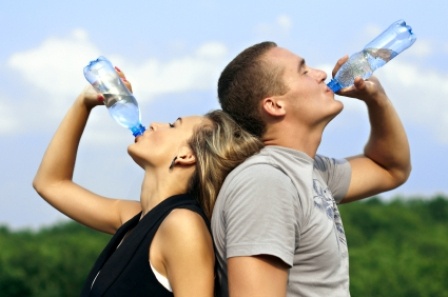Summer is officially about to begin. Sunshine and warm weather should put a smile on your face and make you happy. Well, it does not work for everyone.
As temperatures rise, many people are at greater risk of becoming dehydrated, which not only affects their physical wellbeing but also their moods.
A new study found that feeling unsettled, fatigued or unable to focus may be caused by lack of fluids in the body. Especially women seem to be prone to mood changes stemming from insufficient hydration, the study report, which was published in the Journal of Nutrition, concluded.
Even when only mildly dehydrated, study participants experienced headaches, feelings of exhaustion, and inability to concentrate. They also felt irritable and less sociable.
Although only women were enrolled in this particular research, experts say there is no reason to assume the findings were not applicable to men.
Dehydration often takes place insidiously, meaning most people don’t even feel thirsty when the effects set in. But if lost fluids are not replenished in a timely manner, it can get progressively worse to the point where dehydration can lead to lasting damage, especially to the kidneys.
The fact is that the body cannot function properly without enough fluids. Those are needed to keep its temperature normal, to lubricate and cushion joints, to protect the spinal cord and other sensitive tissues, and to enable waste removal through urination, perspiration, and bowl movements.
Symptoms of mild to moderate dehydration include dry mouth, thirst, decreased output of urine, constipation, dry skin, as well as sleepiness, dizziness and lightheadedness. Severe dehydration has many of the same symptoms but to a much higher degree. Additionally, there can be disorientation, rapid heartbeat, hyperventilation, fever, diarrhea, vomiting, and, in extreme cases, loss of consciousness.
The risk of dehydration is not the same for everyone. Children and the elderly are especially vulnerable, and so are people with chronic illnesses like kidney disease and heart health problems.
Those who work or exercise outside in warm or hot weather are strongly advised to closely monitor their hydration needs. The sensation of thirst is not always a reliable indicator. By the time someone gets thirsty, the dehydration process may have already advanced.
Water is the logical choice to rehydrate the body. Adding fruit juice for quicker absorption or a sports drink like Gatorade to boost electrolytes can provide additional benefits. It is important, however, to limit sugar intake when using such beverages, most simply by diluting them with water.
Timi Gustafson R.D. is a registered dietitian, newspaper columnist, blogger and author of the book “The Healthy Diner – How to Eat Right and Still Have Fun”®, which is available on her blog and at amazon.com. For more articles on nutrition, health and lifestyle, visit her blog, “Food and Health with Timi Gustafson R.D.” (www.timigustafson.com). You can follow Timi on Twitter, on Facebook, Google+ and on Pinterest.


